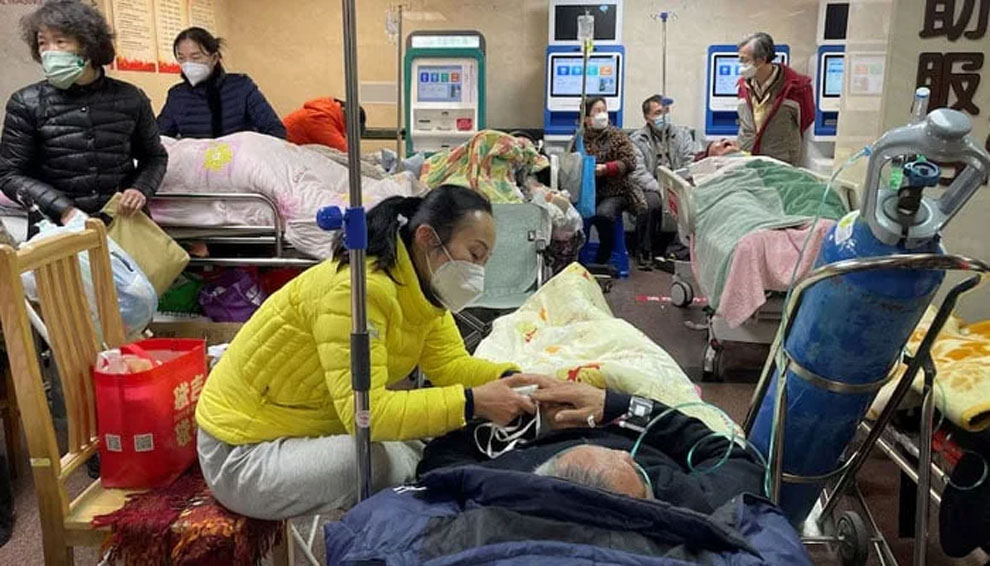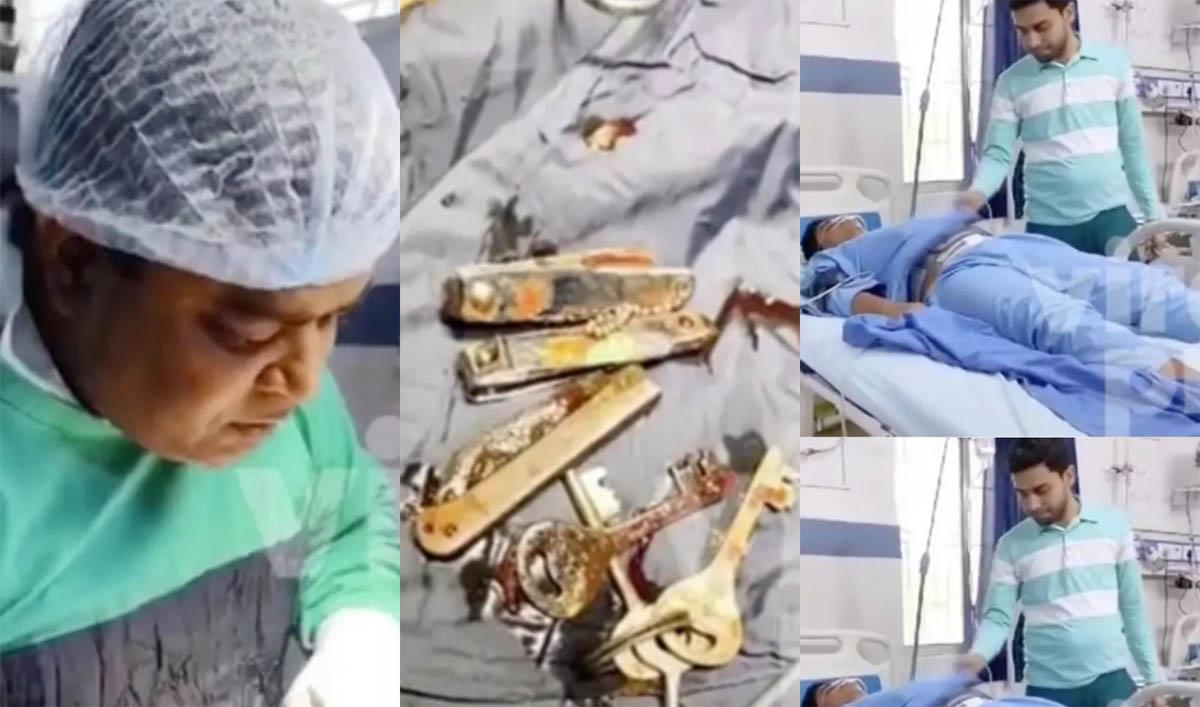Health
‘Don’t Japa’, Professor begs Unilorin graduating nurses

‘Don’t Japa’, Professor begs Unilorin graduating nurses
Adelani Tijani, a Professor of Nursing Science at the Federal University, Oye-Ekiti (FUOYE), has pleaded with nurses to stay and to continue with other healthcare workers to provide adequate healthcare services in the country.
Tijani made the call in Ilorin while speaking at the 6th Professional Induction and Admission Ceremony for the 75 new nurses produced by the nation’s most sought-after ivory tower.
The don observed that Nigeria is greener than other countries while admonishing them not to ‘Japa’ outside the country.
The professor spoke on the topic: “The New Entrants in Nursing and the Integration of Technology into Patient Care: Expectations, Challenges and Opportunities”.
Tijani, who is the Head, Department of Nursing Science at FUOYE, described a nurse as a person authorised by a regulatory body, the Nursing and Midwifery Council of Nigeria (NMCN to practice.
He explained that a professional nurse provides, promotes, prevents, restores and rehabilitates care to individuals, families and communities independently and in collaboration with other members of the health team.
READ ALSO:
-
Police nab 1,005 suspected criminals in Katsina
-
Complete closure of the Gaza Strip violates international law – UN
-
NECO set to release 2023 SSCE results
He reminded them that as the new entrants into the profession they “are expected to care for your patients with passion, make use of available technology to render good quality care”.
Tijani also urged the new nurses to try to avoid anything that can tarnish their names, institution, the nursing profession and Nigeria as a whole.
He said: “Time immemorial, nurses have been going overseas for work, but presently the rate at which nurses take up jobs in high-income countries has increased exponentially.
“As a matter of fact, I know some of you actually embraced this profession due to ‘Japa’ mentality in you, and no one will be surprised if you japa immediately after your years of internship and NYSC”.
Tijani observed that despite the challenges being faced, there are many opportunities awaiting them in the country and the need for “Japa” may not be necessary.
“There are lots of opportunities for you as modern-day nurses. Presently, it seems as if the world is at its knees to receive nurses.
“Note that there are enough spaces for you all in Nigeria’s labour market. Also, there are many agencies – both local and international – looking for your service,” said the don.
‘Don’t Japa’, Professor begs Unilorin graduating nurses
(NAN)
Health
FG to quarantine passengers from China amid virus surge

FG to quarantine passengers from China amid virus surge
The Federal Government says it will implement surveillance measures including quarantining air passengers coming into Nigeria from China, following a surge in respiratory virus cases attributed to the Human Metapneumovirus (HMPV).
This, according to a PUNCH report, is in response to reports of overcrowded hospitals, emergency interventions, and growing public concern in China, where HMPV cases have spiked across northern provinces, particularly affecting children during the winter season.
The Nigerian authorities aim to monitor the situation closely to prevent potential spread within the country.
Neighbouring nations such as Cambodia, Taiwan, and Hong Kong are also taking precautionary measures, though they have reported only a few cases and no widespread outbreaks.
Health experts describe HMPV as a respiratory virus that can cause symptoms ranging from mild cold-like issues to severe complications, especially in children, the elderly, and those with low immune systems.
According to Chinese authorities, there has been a noticeable increase in HMPV cases, especially among children under 14 years old in northern parts of the country.
Social media posts, accompanied by videos of overcrowded hospitals, have raised fears of a larger-scale health crisis.
In response to the rising cases, the Chinese government announced measures, including constant monitoring of cases, the adoption of masks, social distancing and disinfection of public spaces to curb the increase of the virus.
READ ALSO:
- Delta resident stabs man to death for insulting his mother
- Ukraine launches new offensive in Russia’s Kursk
- El-Rufai speaks on report of defection to PDP
The new virus outbreak is coming five years after the emergence of coronavirus – COVID-19 – in Wuhan, China, which was declared a global pandemic by the World Health Organisation on March 11, 2020.
So far, COVID-19 has infected 777 million people globally and killed over seven million, according to WHO.
However, while both HMPV and COVID-19 are respiratory illnesses, there are important differences.
HMPV typically causes milder symptoms such as a cold or flu, while COVID-19, caused by the SARS-CoV-2 virus, can lead to more severe health complications and long-term effects.
HMPV is also a seasonal virus, similar to other cold-causing pathogens like RSV, and infections usually peak during the winter months.
HMPV, like COVID-19, spreads through respiratory droplets when an infected person coughs or sneezes and it can also spread via contaminated surfaces.
However, officials from the National Health Commission stated that while respiratory diseases are expected to rise during the winter months, the overall situation this year is less severe than last year.
Beijing also downplayed the developments as an annual winter occurrence.
China’s foreign ministry spokesperson Mao Ning said on Friday, “Respiratory infections tend to peak during the winter season.
“The diseases appear to be less severe and spread with a smaller scale compared to the previous year,” she said.
The US Centers for Disease Control and Prevention said HMPV could cause upper and lower respiratory diseases in people of all ages, especially among young children, older adults and people with weakened immune systems.
READ ALSO:
- Delta Gov Oborevwori under fire for hobnobbing with APC
- Why Fubara can do business with three lawmakers – Court
- As Hamas, Israel quarrel over talks, Israeli intensifies strikes in Gaza
The US CDC noted that HMPV is most likely spread from an infected person to others through secretions from coughing and sneezing, close personal contact and touching objects or surfaces that have the viruses on them, then touching the mouth, nose or eyes.
“Symptoms commonly associated with HMPV include cough, fever, nasal congestion and shortness of breath. Clinical symptoms of HMPV infection may progress to bronchitis or pneumonia and are similar to other viruses that cause upper and lower respiratory infections.
“The estimated incubation period is three to six days, and the median duration of illness can vary, depending upon severity but is similar to other respiratory infections caused by viruses,” the US CDC stated.
Meanwhile, health authorities in Nigeria are already implementing emergency measures to monitor and manage the spread of the HMPV.
The Director, Special Duties, Office of the Director-General of the Nigeria Centre for Disease Control and Prevention, Dr John Oladejo, told The PUNCH on Sunday that the Federal Government would implement preventive measures by activating surveillance measures to curb the spread of the virus.
“The FG will activate surveillance measures, like quarantine, for passengers coming in from China,” Oladejo said.
Earlier in November 2024, global health body WHO noted that it was closely monitoring the situation and was in close contact with national authorities in China, adding that it would continue to provide updates as warranted.
READ ALSO:
- WAEC announces resit exams for candidates from Jan/Feb 2025
- Hamas lists 34 hostages it may free under ceasefire
- Bandits demand N10m ransom to release abducted Kogi varsity lecturer
“WHO advises against the application of any travel or trade restrictions based on the current information available on this event,” the body added.
First detected in Pakistan in 2001, the HMPV has caused several outbreaks over the years in the Asian nation, primarily affecting children, but the virus is new to Africa as there haven’t been reported cases on the continent.
“Human Metapneumovirus was first identified in Pakistan in 2001, and outbreaks have been reported since then,” an official at the National Institute of Health, Islamabad, said.
“In 2015, a study conducted at Pakistan Institute of Medical Sciences found 21 cases of HMPV in children hospitalised with severe lower respiratory tract infections.”
Meanwhile, medical experts have stated that implementing surveillance measures against the virus was a crucial and appropriate step in ensuring that it doesn’t spread to the country.
They emphasised that surveillance should be an ongoing process carried out continuously by the government.
A virologist at the Department of Virology, College of Medicine, University College Hospital, Ibadan, Dr Moses Adewumi said, “On good day, surveillance should always be part of us. What happens most times is that despite the amount that was voted for COVID-19, we seem to have relaxed. Our people are more interested in spending the money, and after that, we probably decide to go to sleep. So, the surveillance should be a continuous thing.
“It is good that we increase our surveillance for people coming into the country, especially from China, Japan and other places, where we have the outbreaks. The government should be more involved in surveillance because most of the surveillance and all the research we do is funded by foreign bodies, so our own government should be more interested in research, in surveillance for all these viruses.
“The virus is not new but the surge may be because there is a different variant, and that is why we need to increase our surveillance and monitor it closely to curtail its introduction into the country. Experience has taught us that if we check now, we may have our people with antibodies already, and that’s a confirmation that it’s likely that this is circulating here, maybe not the exact variants that they have now.”
Also, an Associate Professor of Infectious Diseases and Genomics in the Department of Microbiology at the Adeleke University, Osun State, Oladipo Kolawole, noted that the decision by the government to implement surveillance measures was a good one, adding that it aimed to monitor and control the potential spread of the virus, ensuring public health safety as the situation developed.
Kolawole said, “The government is likely to enhance screening processes at points of entry and provide guidelines for travellers from China, this is to mitigate risks associated with HMPV.
“Activating surveillance allows for the early detection of cases, which is essential in managing outbreaks effectively.
“Monitoring travellers from regions experiencing outbreaks can help identify and isolate cases before they spread within the community.
“Also, quarantine for inbound passengers from the affected regions can significantly reduce the risk of transmission.
“It serves as a precautionary measure to ensure that individuals who may be infected do not unknowingly spread the virus to others. Finally, this situation underscores the importance of preparedness in public health systems.”
FG to quarantine passengers from China amid virus surge
(Punch)
Health
Surgeon contracts cancer after operating on patient

Surgeon contracts cancer after operating on patient
A surgeon accidentally contracted cancer from a patient in a first of its kind occurrence. The patient, a 32-year-old man from Germany, had a unique form of cancer and was undergoing surgery to remove a tumour from his abdomen.
During the operation, the surgeon accidentally cut his hand. Although he cleaned and bandaged the wound right away, five months later, a small lump appeared at the injury site. When examined, it was found to be a malignant tumour, genetically identical to the cancer from the patient.
The medical team concluded that the surgeon likely caught the cancer when tumour cells entered the cut. The case was unusual because normally, the body fights off foreign tissue, which would have been expected in this situation. However, the tumour’s growth indicated the surgeon’s immune system did not effectively respond to the cancer cells.
Originally reported in 1996, this case gained new attention after being published in The New England Journal of Medicine. The report detailed how the surgeon injured his left hand while placing a drain during surgery. Despite the patient’s initial success in surgery, he later passed away due to complications.
Months later, a hard swelling appeared on the surgeon’s finger. Although tests showed no initial abnormalities, the growth was ultimately found to be a malignant fibrous histiocytoma.
READ ALSO:
- Meta deletes AI accounts after backlash over posts
- As Tinubu visits Enugu, Ohanaeze calls for rousing welcome
- Nasarawa Gov Sule sacks commissioners, SSG, others
Both tumours were analysed and declared identical, suggesting that cancer cells from the patient had entered the surgeon’s body through the cut. The report emphasized that normally, the immune system would reject transplanted tissue.
In this case, while there was inflammation around the tumour, it still increased in size, indicating a failure of the immune response. Researchers proposed that the tumour might have escaped destruction by changing its cell molecules and evading the surgeon’s immune system.
Two years after the surgeon had his tumour removed, there were no signs of cancer returning. The study also highlighted cases where heart transplant patients adopt traits from their donors.
Doctors found the case intriguing because the transplanted tissue is different from the host’s tissue, making it a target for the immune system, which tries to reject it. This is why people who receive organ transplants need to take immunosuppressive medications to prevent their bodies from rejecting the new organ.
In this specific situation, although the surgeon experienced inflammation around his original incision, his immune system did not stop the tumor from growing. Instances like the surgeon’s are very rare, and there are no reliable statistics on cancer that is transferred through organ transplants.
Health
US issues new advisory linking alcohol to cancer

US issues new advisory linking alcohol to cancer
The United States’ Surgeon General, Dr. Vivek Murthy, has issued a public advisory emphasizing the significant link between alcohol consumption and cancer.
Released Friday, the guidance is based on research identifying alcohol as a contributor to at least seven types of cancer.
According to the advisory, alcohol increases the likelihood of developing cancers of the throat, liver, esophagus, mouth, larynx, colon, and rectum. It further identifies alcohol as the third leading preventable cause of cancer in the U.S., following tobacco use and obesity.
“Alcohol is a well-established, preventable cause of cancer responsible for about 100,000 cases of cancer and 20,000 cancer deaths annually in the United States – greater than the 13,500 alcohol-associated traffic crash fatalities per year in the U.S. – yet the majority of Americans are unaware of this risk,” Dr. Murthy stated. “This Advisory lays out steps we can all take to increase awareness of alcohol’s cancer risk and minimize harm.”
How Alcohol Contributes to Cancer
The advisory outlines four primary mechanisms by which alcohol increases cancer risk:
Acetaldehyde Exposure: Alcohol breaks down into acetaldehyde, a chemical that can damage DNA and elevate cancer risk.
Oxidative Stress: Alcohol triggers oxidative stress, harming DNA, proteins, and cells while causing inflammation.
Hormonal Changes: Alcohol alters hormone levels, such as estrogen, which has been linked to an increased risk of breast cancer.
READ ALSO:
- Edo LG chairman, 8 councillors, defect to APC
- Ghana President Akufo-Addo’s address disrupted as ADC collapses (Video)
- Vegas Tesla blast suspect shot himself in head – Officials
The advisory notes that more than 16% of breast cancer cases are associated with alcohol use.
Enhanced Absorption: Alcohol facilitates conditions that allow it to be absorbed more readily, compounding its risks.
The advisory also emphasizes that individual risk is influenced by a combination of biological, environmental, social, and economic factors.
Steps to Mitigate Risk
Dr. Murthy’s recommendations include adding warning labels to alcoholic beverages highlighting the cancer risk and reassessing guidelines on alcohol consumption limits. He encourages individuals to make informed decisions about their alcohol intake and calls on healthcare professionals to educate the public about the risks.
“Too many Americans are living with an outdated assumption that some amount of alcohol is not only harmless, but also good for you,” the advisory warns.
Expert Reactions
Dr. Marc Siegel, a clinical professor at NYU Langone Health, supported the advisory’s findings. “Increasing evidence shows that [alcohol being harmless] isn’t true,” he told Fox News Digital.
Dr. Siegel noted that alcohol, often viewed as a stress-reliever, is a “proven toxin” with clear links to diseases of the liver, heart, and brain. While traditional guidelines suggest moderate drinking—up to one drink daily for women and two for men—Siegel pointed out, “In fact, no amount of alcohol is healthy.”
The pandemic further complicated the issue, with alcohol consumption rising by 25% during periods of heightened stress and isolation.
“The timing of this advisory is right on the mark,” Dr. Siegel added, stressing the need for a public shift in understanding alcohol’s risks.
US issues new advisory linking alcohol to cancer
(FOX NEWS)
-

 News2 days ago
News2 days agoReactions as Mahama calls Tinubu ‘president of Ghana’ during inaugural speech
-

 metro2 days ago
metro2 days agoPrison officer sentenced for engaging in sexual activity with inmate
-

 metro10 hours ago
metro10 hours agoPolice arrest Lagos teacher over alleged abuse of three-year-old pupil
-

 Education2 days ago
Education2 days agoPoly graduates protest proposed exclusion from NYSC
-

 metro2 days ago
metro2 days agoTwo killed in Abuja Islamic school bomb explosion, proprietor arrested
-

 Business1 day ago
Business1 day agoI rose from Almajiri to CEO of NNPC, says Mele Kyari on 60th birthday
-

 Sports2 days ago
Sports2 days agoBreaking: NFF appoints Eric Chelle as Super Eagles coach
-

 metro1 day ago
metro1 day agoTinubu splits Nigerian Aviation College into six campuses













